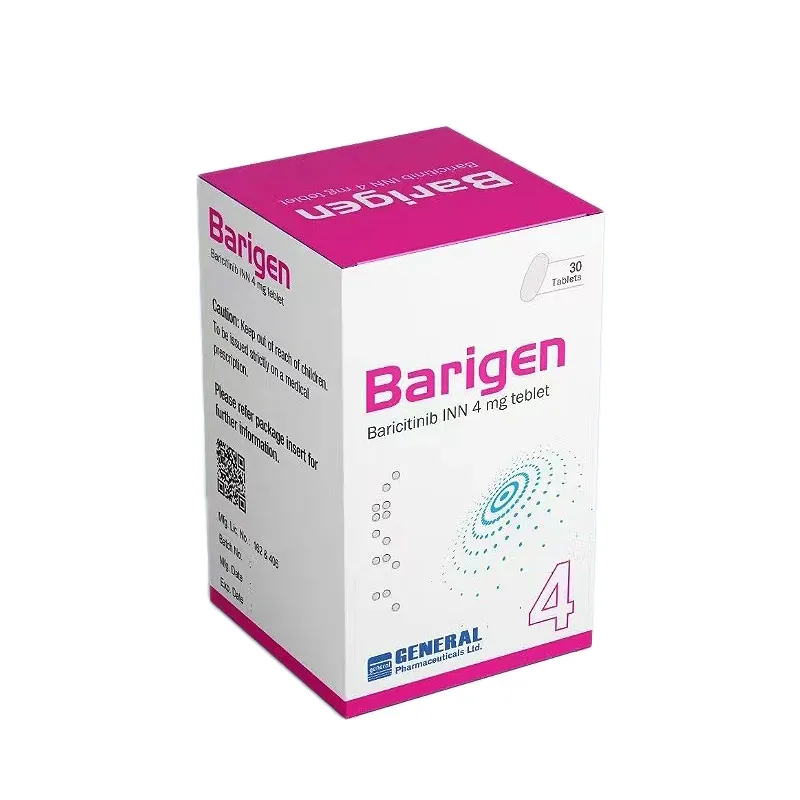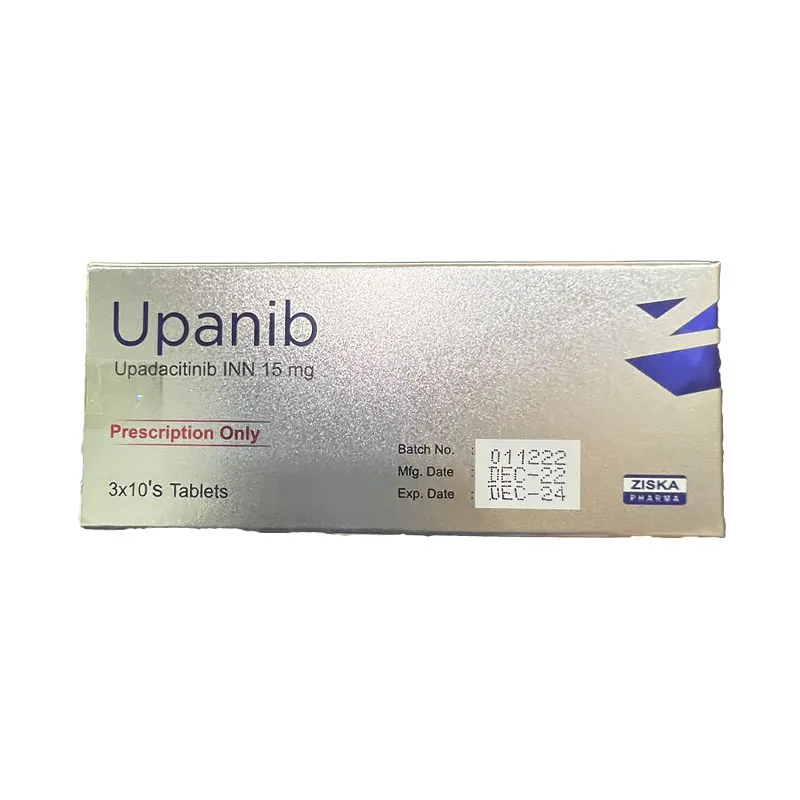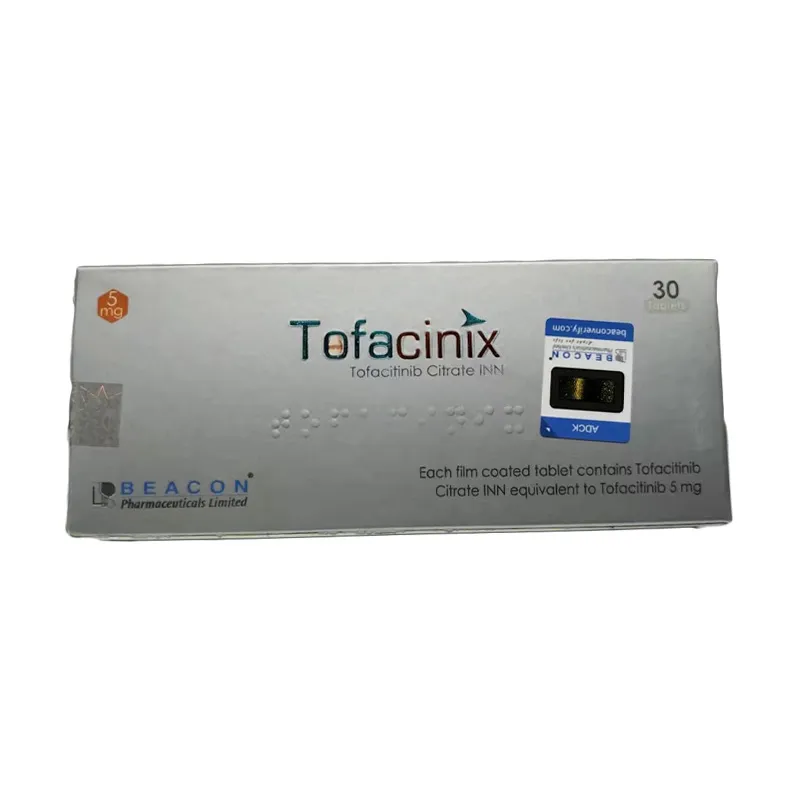Buy Baricitinib Online (Barigen)
Inquire NowTable of Contents
ToggleWhat is Barigen (Baricitinib)?
Baricitinib is used alone or with other medications to treat rheumatoid arthritis (condition in which the body attacks its own joints causing pain, swelling, and loss of function) in adults who have not responded well to one or more tumor necrosis factor (TNF) inhibitor medication(s).
Baricitinib is also used to treat coronavirus disease 2019 (COVID-19 infection) caused by the SARS-CoV-2 virus in hospitalized adults who require supplemental oxygen, mechanical ventilation (a machine that helps you breathe), or extracorporeal membrane oxygenation (ECMO) (a machine that supports your heart and lungs). Baricitinib is in a class of medications called Janus kinase (JAK) inhibitors. It works by decreasing the activity of the immune system. To know more visit here.
Why should you buy the generic Baricitinib online?
First of all generic Barigen is very affordable version of baricitinib for rheumatoid arthritis and alopecia areata patients. It is a verified generic version of Olumiant. General pharmaceuticals Limited manufacture this generic version in Bangladesh. It is one of the renowned pharmaceutical companies who mostly made medicine for local patients in Bangladesh.
After the Directorate General of Drug Administration of Bangladesh approves to manufacture baricitinib , they started to make it and sell it all over the world where generic medicine is allowed to use. It is the first generic version of Olumiant which is selling regularly all over the world. It is also 99% cheaper than the brand version of baricitinib. Which cost you less than 40 dollars. There are some more medicine available for rheumatoid arthritis and alopecia areata patients. Tofacitinib is one of them. To know more you can visit our shop page.
Presentation
Barigen 2 Tablet: Each film-coated tablet contains Baricitinib INN 2 mg
Barigen 4 Tablet: Each film-coated tablet contains Baricitinib INN 4 mg
Pharmacological information of Baricitinib
Therapeutic class: Anti-Rheumatic
Pharmacological action
Mechanism of Action
Baricitinib is a selective and reversible inhibitor of Janus kinase (JAK) 1 and JAK2. In isolated enzyme assays, Baricitinib inhibited the activities of JAK1, JAK2, Tyrosine Kinase 2 and JAK3 with IC50 values of 5.9, 5.7, 53 and > 400 nM, respectively. Janus kinases (JAKs) are enzymes that transduce intracellular signals from cell surface receptors for a number of cytokines and growth factors involved in haematopoiesis, inflammation and immune function.
Within the intracellular signalling pathway, JAKs phosphorylate and activate signal transducers and activators of transcription (STATs), which activate gene expression within the cell. Baricitinib modulates these signalling pathways by partially inhibiting JAK1 and JAK2 enzymatic activity, thereby reducing the phosphorylation and activation of STATs.
Pharmacodynamics
Inhibition of IL-6 induced STAT3 phosphorylation:
Administration of Baricitinib resulted in a dose dependent inhibition of IL-6 induced STAT3 phosphorylation in whole blood from healthy subjects with maximal inhibition observed 2 hours after dosing which returned to near baseline by 24 hours.
Immunoglobulins:
Mean serum IgG, IgM, and IgA values decreased by 12 weeks after starting treatment with Baricitinib, and remained stable at a lower value than baseline through at least 104 weeks. For most patients, changes in immunoglobulins occurred within the normal reference range.
Lymphocytes:
Mean absolute lymphocyte count increased by 1 week after starting treatment with Baricitinib, returned to baseline by week 24, and then remained stable through at least 104 weeks. For most patients, changes in lymphocyte count occurred within the normal reference range.
C-reactive protein:
In patients with rheumatoid arthritis, decreases in serum C -reactive protein (CRP) were observed as early as 1 week after starting treatment with Baricitinib and were maintained throughout dosing.
Creatinine:
Baricitinib induced a mean increase in serum creatinine levels of 3.8 μmol/L after two weeks of treatment, as compared to placebo, which remained stable thereafter during up to 104 weeks of treatment. This may be due to inhibition of creatinine secretion by Baricitinib in the renal tubules.
Consequently, estimates of the glomerular filtration rate based on serum creatinine may be slightly reduced, without actual loss of renal function or the occurrence of renal adverse events.
Pharmacokinetics
Following oral administration of Baricitinib, a doseproportional increase in systemic exposure was observed in the therapeutic dose range. The PK of Baricitinib is linear with respect to time.
Absorption:
Following oral administration, Baricitinib is rapidly absorbed with a median tmax of approximately 1 hour (range 0.5 – 3.0 h) and an absolute bioavailability of approximately 79 % (CV = 3.94 %). Food intake led to a decreased exposure by up to 14 %, a decrease in Cmax by up to 18 % and delayed tmax by 0.5 hours.Administration with meals was not associated with a clinically relevant effect on exposure.
Distribution:
Mean volume of distribution following intravenous infusion administration was 76 L, indicating distribution of Baricitinib into tissues.Baricitinib is approximately 50 % bound to plasma proteins.
Biotransformation:
Baricitinib metabolism is mediated by CYP3A4, with less than 10 % of the dose identified as undergoing biotransformation. No metabolites were quantifiable in plasma.
Elimination:
Renal elimination is the principal mechanism for Baricitinib’s clearance through glomerular filtration and active secretion via OAT3, Pgp, BCRP and MATE2-K.
Specific populations
Renal Impairment:
Renal function was found to significantly affect Baricitinib exposure. The mean ratios of AUC in patients with mild and moderate renal impairment to patients with normal renal function are 1.41 (90 % CI: 1.15-1.74) and 2.22 (90 % CI: 1.81-2.73), respectively. The mean ratios of Cmax in patients with mild and moderate renal impairment to patients with normal renal function are 1.16 (90 %CI: 0.92-1.45) and 1.46 (90 %CI: 1.17-1.83), respectively.
Hepatic Impairment:
There was no clinically relevant effect on the PK of Baricitinib in patients with mild or moderate hepatic impairment. The use of Baricitinib has not been studied in patients with severe hepatic impairment.
Elderly:
Age ≥ 65 years or ≥ 75 years has no effect on Baricitinib exposure (Cmax and AUC)
Other intrinsic Factors:
Body weight, sex, race, and ethnicity did not have a clinically relevant effect on the PK of Baricitinib. The mean effects of intrinsic factors on PK parameters (AUC and Cmax) were generally within the inter-subject PK variability of Baricitinib. Therefore, no dose adjustment is needed based on these patient factors.
Therapeutic indications
Baricitinib is indicated for the treatment of moderate to severe active rheumatoid arthritis in adult patients who have responded inadequately to, or who are intolerant to one or more disease-modifying anti-rheumatic drugs. Baricitinib may be used as monotherapy or in combination with Methotrexate.
Dosage & Administration
The recommended dose of Baricitinib is 4 mg once daily. A dose of 2 mg once daily is appropriate for patients such as those aged ≥ 75 years and may be appropriate for patients with a history of chronic or recurrent infections. A dose of 2 mg once daily may also be considered for patients who have achieved sustained control of disease activity with 4 mg once daily and are eligible for dose tapering.
Treatment should not be initiated in patients with an absolute lymphocyte count (ALC) less than 0.5 x 109 cells/L, an absolute neutrophil count (ANC) less than 1 x 109 cells/L, or who have a haemoglobin value less than 8 g/dL. Treatment may be initiated once values have improved above these limits.
Method of administration
Oral use:
Baricitinib is to be taken once daily with or without food and may be taken at any time of the day.
Adverse reactions
The most commonly reported adverse drug reactions (ADRs) occurring in ≥ 2 % of patients treated with Baricitinib monotherapy or in combination with conventional synthetic DMARDs were increased LDL cholesterol (33.6 %), upper respiratory tract infections (14.7 %) and nausea (2.8 %). Infections reported with Baricitinib treatment included Herpes zoster.
Contraindications
Hypersensitivity to the active substance or to any of the excipients of Barigen.
Pregnancy:
Baricitinib is contraindicated during pregnancy.Women of childbearing potential have to use effective contraception during and for at least 1 week after treatment. If a patient becomes pregnant while taking Baricitinib the parents should be informed of the potential risk to the fetus.
Breast-feeding:
A risk to newborns/infants cannot be excluded and Baricitinib should not be used during breast-feeding. A decision must be made whether to discontinue breast-feeding or to discontinue Baricitinib therapy taking into account the benefit of breast-feeding for the child and the benefit of therapy for the woman.
Fertility:
The effect of Baricitinib on human fertility has not been evaluated. Studies in animals suggest that treatment with Baricitinib has the
potential to decrease female fertility while on treatment, but there was no effect on male spermatogenesis.
Drug interactions:
Pharmacodynamics interaction
Immunosuppressive medicinal products:
Combination with biologic DMARDs or other JAK inhibitors has not been studied. Use of Baricitinib with potent immunosuppressive medicinal products such as Azathioprine, Tacrolimus, or Ciclosporin was limited in clinical studies of Baricitinib, and a risk of additive immunosuppression cannot be excluded.
Cytochrome P450 enzymes
In vitro, Baricitinib is a cytochrome P450 enzyme (CYP)3A4 substrate although less than 10 % of the dose is metabolised via oxidation. In clinical pharmacology studies, co-administration of Baricitinib with Ketoconazole (strong CYP3A inhibitor) resulted in no clinically meaningful effect on the PK of Baricitinib. Coadministration of Baricitinib with Fluconazole (moderate CYP3A/CYP2C19/CYP2C9 inhibitor) or Rifampicin (strong CYP3A inducer) resulted in no clinically meaningful changes to Baricitinib exposure.
Warnings and precautions
Infections:
Baricitinib is associated with an increased rate of infections such as upper respiratory tract infections compared to placebo. In treatment naïve patients, combination with Methotrexate resulted in increased frequency of infections compared to Baricitinib monotherapy. The risks and benefit of treatment with Baricitinib should be carefully considered prior to initiating therapy in patients with active, chronic or recurrent infections.
If an infection develops, the patient should be monitored carefully and Baricitinib therapy should be temporarily interrupted if the patient is not responding to standard therapy. Baricitinib treatment should not be resumed until the infection resolves.
Tuberculosis:
Patients should be screened for tuberculosis (TB) before starting Baricitinib therapy. Baricitinib should not be given to patients with active TB. Anti-TB therapy should be considered prior to initiation of Baricitinib in patients with previously untreated latent TB.
Overdose
In case of an overdose, it is recommended that the patient be monitored for signs and symptoms of adverse reactions. Patients who develop adverse reactions should receive appropriate treatment.
Pharmaceutical information
Storage:
Store below 30°C and dry place, away from light. Keep out of the reach of children.
Packing:
Barigen 2 Tablet: Each box contains 1 bottle with each bottle of 30 tablets.
Barigen 4 Tablet: Each box contains 1 bottle with each bottle of 30 tablets.
Buy Baricitinib Online (Barigen)
Are you interested to buy baricitinib online? Don’t worry. 100 Meds can help you to find reliable and verified medicine at affordable cost. Please contact our support team by using email, whatsapp or wechat. Even you can contact our facebook page.
You must be logged in to post a review.






Reviews
There are no reviews yet.